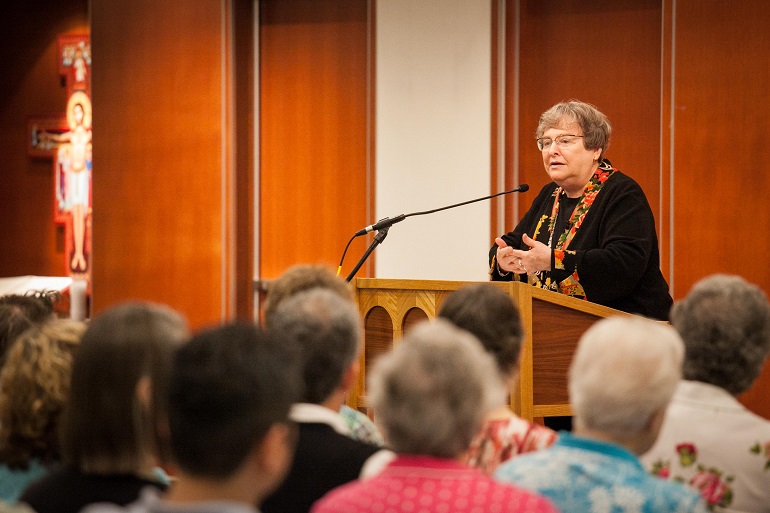
Elizabeth Johnson at Catholic Theological Union in Chicago. Photo by Millicent Wong Photography and Design
“Is God’s charity broad enough for bears?” Naturalist John Muir asked the question, but theologian Sister Elizabeth A. Johnson, CSJ, sought to answer it during a lecture Wednesday evening as part of the Summer Institute at Catholic Theological Union in Chicago.
Johnson’s short answer was yes, God’s mercy is broad enough for all of creation, not just for humans, and that caring for the earth must be essential to faith, not just another issue or “add on.” Given the crisis facing creation--in which some 23,000 species become extinct each year--Johnson called for a conversion “to the earth,” a conversion grounded in a deeper Trinitarian understanding of God.
“Loving the earth must become an intrinsic part of loving God,” said Johnson, professor of theology at Fordham University and author of a number of books, including the recent “Ask the Beasts: Darwin and the God of Love” (Bloomsbury, 2014)
With Pope Francis’ upcoming encyclical on the environment, many Catholics are talking about ecological issues, but otherwise religious people tend not put an emphasis on them, Johnson said. “When was the last time you heard--or gave--a homily about creation?” she asked the audience of more than 150 students, faculty and others.
She listed several impediments, including the history of hierarchal dualisms between the spiritual and the physical, or between the natural and the supernatural, in which patriarchy has associated women with the “lower” physical world. With their “head in the clouds,” Christians were only able to have deep communion with God if they turned away from the earth. “In order to be holy, a person must flee the world,” she said.
The use of the word “dominion” in Genesis, which was understood as “domination,” especially to justify colonization, also contributed to the current lack of emphasis on care for creation, as did the emphasis on sinfulness, the cross and atonement during the Reformation, she said.
Johnson pointed to the Holy Spirit and Jesus as sources from the Christian tradition to support this “conversion to the earth.”
A “weak pneumatology” in the Western church has led to an overemphasis on creation as a past event, she said. “The Creator did not retire after the first six days,” Johnson said. “Everything is constantly enlivened by the continuous creation of God.”
The language used for the Holy Spirit, especially as fire, comes from the natural world, Johnson noted, quoting both mystic Hildegard of Bingen and scholastic Thomas Aquinas, who both used the metaphor of fire to recognize that creation was imbued with the continuous presence of the Spirit.
The reality of death means all of creation is “a place of agony,” Johnson said, adding that the compassionate presence of God exists in the midst of that agony. Drawing on Danish theologian Niels Gregersen’s idea of “deep incarnation,” Johnson argued that Jesus’ incarnation--in which he became “flesh” (not just “human”)--extends to all of creation.
By dying, Jesus shared the fate of every living thing, and his rising extends hope not only to all people, but to all of creation, she said, quoting St. Ambrose: “In Christ’s resurrection, earth itself arose.”
The current destruction of life on earth is “profoundly wrong,” a moral failure and sinful, Johnson said. In response, an intellectual, emotional and ethical conversion to the earth is necessary.
“We have done theology looking in the mirror at ourselves,” she said. “Now it is time to look out the window to see that we are part of a bigger world…We haven’t a moment to lose.”




